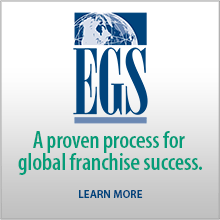Working with US Commercial Service (USCS) to Succeed in Taking Your US Franchise into New Countries
According to an International Franchise Association (IFA) early 2014 survey of its franchisor members, 82% now think that taking their franchise international is important to the future success of their franchise. Five years ago, 54% thought going international was important.
Based on 25 years of international franchise experience as a franchisor, master franchisee and, most recently helping over 20 US franchisors go international, I know the most difficult task is finding the right country and the right licensee for your particular franchise.
One solution for US franchises can be working with the U.S. Commercial Service (USCS), the international-focused arm of the U.S. Department of Commerce. The USCS has experts on the ground in over 100 countries whose job is to help US companies sell their products and services.
There are several ways the USCS can help a franchisor go global:
- Country and Sector Reports
- Gold Keys – in-country meetings with pre-qualified licensee candidates
- Franchise Trade Missions – to the Philippines, Mexico and India in 2014
- Background checks on licensee candidates
- Meeting arrangements and local advertising
- Local business and cultural knowledge
- Follow-up after your in-country meetings
But this is not magic where you get on the airplane, land in the new country, meet your new licensee, sign an agreement, get back on the plane for home, and the new licensee sends you the initial license fee. To have a chance at success using the USCS team in any particular country, the franchisor must know and clearly communicate the following:
- Why do you want to enter this particular country?
- What is the profile of whom you want as a licensee?
- How is your brand different than what is already in their country?
- Detailed, clear information on your franchise
- Clear steps and terms for acquiring your franchise
- A financial model that shows how your franchise will succeed in their country
- What training, support and marketing help your franchise will give the licensee
And the franchisor needs to clearly define what they want in an international licensee or master franchisee in a country, such as:
- A passion for and understanding of your business
- A successful business with knowledge in your sector
- Good reputation in the country
- Experienced management to put into your franchise
- Access to suitable real estate
- Marketing oriented company
- The capital to start and grow your franchise in their country
Our company, EGS, has successfully worked with the USCS in over 20 countries around the world since 2001. Here are a few of the successes we have had in recent years working with the USCS:
- Central America – Fuddruckers®
- Chile – Denny’s® and Fuddruckers®
- China – Right At Home Senior Care® and Rita’s Italian Ice®
- Dominican Republic – Denny’s®
- Indonesia – The Melting Pot®
- Ireland – Mr. Handyman® and Two Men And A Truck®
- Mexico – Build-A-Bear Workshop®, Denny’s® and The Melting Pot®
- Mongolia – Round Table Pizza®
- Singapore and Malaysia – Abrakadoodle®
- Viet Nam – Carl’s Jr.®
Not all USCS posts in all countries are able to help find area licensees and master franchisees. To find out whether the local office has a specialist for franchising, go to the following website for specific countries: www.export.gov/country
Or you can contact Ms. Jennifer Loffredo, the U.S. Commercial Service Officer based in the US who manages the USCS Global Franchise Team: (248)452-2254, Jennifer.Loffredo@trade.gov
A close working relationship with the USCS people on the ground in the country, plus patience in finding and signing the right licensee for your specific franchise, are critical to success in using this valuable resource for US franchisors. At the end of the day, you have to help the USCS post help you find your licensee in a country.
The Certified Franchise Executive (CFE) Designation – A Global Standard
The global franchise industry covers 75 sectors and over 100 countries where the franchise business model is active. Millions of people around the world are employed in the franchise industry. A very high number of consumers around the world shop at franchised businesses.
Up until the early 1990s one of the major challenges to success in the franchise community was a lack of structured, best practices training for people at all levels in the global franchise community. It was difficult for franchise companies to quantify the experience of the people they hired to help grow their businesses.
Then the International Franchise Association (IFA) began developing certified courses in all aspects of franchise development, operations and management. From this came the professional Certified Franchise Executive designation. Today, many global franchise executives look for the CFE designation before hiring key members of their franchise team. We know their background and education. Many franchisors prefer to hire industry suppliers who have completed this certification.
At the just completed 54th annual IFA convention in New Orleans, the 1,000th Certified Franchise Executive received this now cherished industry recognition. Franchise industry members from Australia, Brazil, Canada, Indonesia, Saudi Arabia, Singapore, the Philippines and the USA received their CFE pins last month at the IFA convention. The IFA Educational Foundation has cooperative agreements with franchise associations and educational institutions in Australia, India, the Philippines, Singapore and Thailand to offer the CFE program to their members.
The now global CFE program is administered by the Institute of Certified Franchise Executives (ICFE), whose mission is to enhance the professionalism of franchising by certifying the highest standards of quality training and education. The ICFE offers a wide range of continuing education programs for professional development. Meeting the requirements of the program and completing the course of study leads to the Certified Franchise Executive (CFE) designation.
Certified Franchise Executives are bound by a strong code of ethics, have completed a significant number of state-of-the-industry courses and attended many industry meetings. Industry experience is critical to obtaining the CFE award. Each CFE must recertify every three years.
The International Franchise Association website has a special and detailed section on the CFE value, program and process:
Here are some quotes from highly experienced and successful franchise executives on the value of the CFE program:
“The CFE program provides a forum that supports continued professional development and adherence to the highest standards in franchising. It is also a wonderful way to form valuable relationships and generate new ideas from different perspectives.” Rosemarie Hartnett, CFE, President, Abrakadoodle®
“CFE is a commitment to oneself and your company to be the best that you can be and to share that with others within the franchise community. I have not only learned important information to bring back to my organization, I have also developed important relationships that have assisted me in developing Decor & You. Through this process I have also been able to share what I know with others and add value. It is a great thing to receive but also to be able to give back.” Karen Powell, CFE, Chief Relationship Officer/Franchise Source Brands International CEO/Decor&You
“At Snap-On, we believe in being a great franchisor, as well as a great tool company. Developing the management team that supports our franchisees is key to this endeavor. The CFE program facilitates this learning, and not only ensures our compliance to the principles of franchising, but also the critical nature of our relationship with our franchisees.” Barrie Young, CFE, President, Sales & Franchising, Snap-On-Tools Company, LLC
To download a brochure on the Certified Franchise Executive program, please go to the following link:
Infographics for the Franchise Sector
Wikipedia defines an infographic as “graphic visual representations of information, data or knowledge intended to present complex information quickly and clearly.”
http://en.wikipedia.org/wiki/Infographic
Our world moves so fast today that it is hard to get people to read long articles and sometimes even bullet point slides with few words. Infographics help overcome this barrier to communication. Infographics are simply quick to read and easy to understand data visualizations.
In the franchise industry – comprised of 75 different business sectors and over 3,000 brands in the U.S. – the International Franchise Association (IFA) does an excellent job of keeping its members up to date on franchising today through two infographics.
The first can be downloaded at the following link and quickly explains the scope of franchising in the U.S. today: almost 800,000 franchised business locations in the U.S. directly employing over 8.5 million people and producing 839 billion in economic output a year. This infographic also shows the different types of franchises. Food and hospitality accounts for 65% of all franchises in the USA.
http://emarket.franchise.org/EconomicOutlookInfographic2014.pdf
ADP, the payroll people who project employment from month to month, have recently started issuing a monthly National Franchise Report infographic that shows how many franchise related jobs were added and in which sectors. This PDFed infographic also shows graphically which industry sectors added and lost jobs during the month
http://www.adpemploymentreport.com/2013/December/NFR/docs/NFRDecember2013.pdf
There is an immense amount of data on these two one-page infographics that are easy to scan quickly instead of reading a long and detailed report, which most humans are now hesitant to do!

